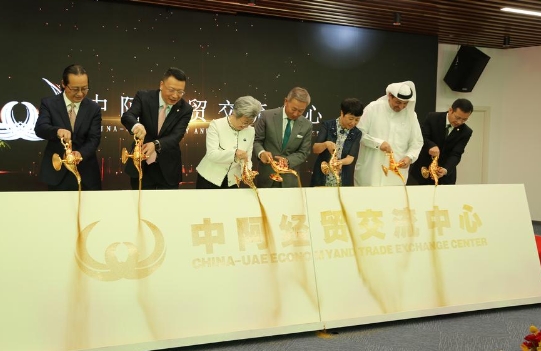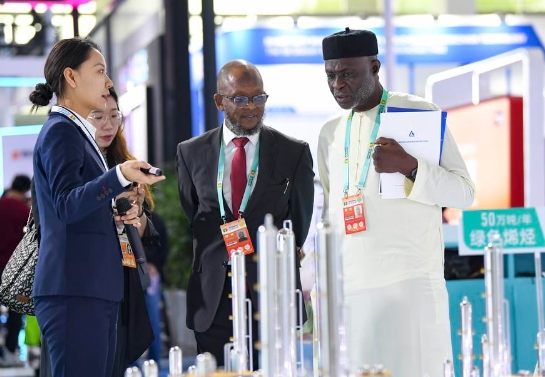Senior Arab official lauds China-Arab ties, calls for more just global governance

Guests attend the inauguration ceremony of the China-UAE Economy and Trade Exchange Center at the China Pavilion of Dubai Expo City in Dubai, the United Arab Emirates (UAE), Dec. 6, 2024. (Xinhua/Wen Xinnian)
Arab countries and China share a common stance on global issues, especially a joint commitment to international law, support for multilateralism, and opposition to hegemonism and "double standards."
Lauding the substantial progress in Arab-China relations, a senior Arab official has called for building a more equitable and inclusive global economic governance system.
Arab countries and China have always supported each other and share a common position on global issues, said Mohammed Ahmed Al-Yamahi, speaker of the Arab Parliament, in a recent interview with Xinhua.
The two sides work together well to safeguard the global trading system and the interests of developing countries, and promote the development of a more equitable and inclusive global economic governance system, he said.
The official also highlighted the mutual support between the two sides on issues related to each other's core interests.
China firmly supports the just cause of Arab countries, especially the just cause of the Palestinian people in restoring their legitimate national rights, Al-Yamahi said.
Arab countries firmly uphold the one-China principle, resolutely oppose any form of "Taiwan independence," and strongly support the Chinese government's efforts to achieve national reunification, he said.
Exchanges and cooperation between Arab countries and China, featuring mutual respect and a joint pursuit of win-win outcomes, have been continuously deepening across various fields, including politics, economy and culture, he noted.
He spoke highly of the exchange mechanism between the Arab Parliament and China's National People's Congress (NPC), saying that it not only enhances interactions between the two sides but also fosters the sharing of experience in legislative supervision and other crucial areas.

Guests learn about a clean energy project at the sixth China-Arab States Expo in Yinchuan, northwest China's Ningxia Hui Autonomous Region, Sept. 22, 2023. (Xinhua/Feng Kaihua)
Such a mechanism has greatly facilitated coordination within both bilateral and multilateral frameworks, and provided robust legislative backing for collaboration in key fields such as economy, culture and science, he said.
"The Arab Parliament, through its cooperation with the NPC of China, is actively promoting policies that foster peace and development for Arab countries, China and the global community," said the speaker.
He stressed that Arab countries and China share a common stance on global issues, especially a joint commitment to international law, support for multilateralism, and opposition to hegemonism and "double standards."
Al-Yamahi noted that the world is facing growing challenges, adding that the protectionist policies pursued by some countries threaten the stability of international trade and harm the interests of developing countries.
"The protectionist policies by the United States contradict the principles of the multilateral trading system, damage global supply chains and undermine inclusive economic growth," he said.
He called on all countries to strengthen international cooperation and work toward building a more equitable and inclusive global economic governance system, in order to better safeguard the economic and development interests of the vast number of developing countries.
Editor:伏娅敏
